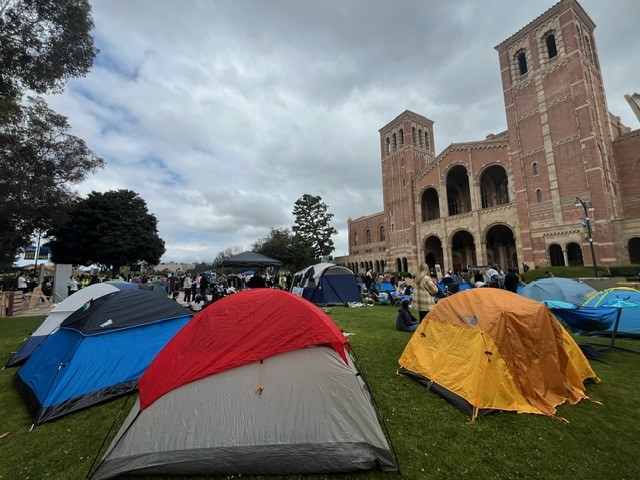A relative of Gov. Arnold Schwarzenegger and one of his former cabinet secretaries are part of a private investment group that could score a lucrative payoff if regulators approve a sprawling solar-energy complex near the Mojave Desert Preserve.
The personal connections have raised questions about possible favorable treatment for a project being touted as a breakthrough in the development of solar power.
Robert F. Kennedy Jr., an environmental attorney who is the cousin of first lady Maria Shriver, and former state Environmental Protection Secretary Terry Tamminen were named senior advisers at VantagePoint Venture Partners last year.
VantagePoint has a multimillion-dollar stake in startup BrightSource Energy, which plans to spend up to $2 billion to construct solar-power plants on nearly 6 square miles of cactus-studded land along the Nevada border.
If approved, the project would be the first solar-generating station on U.S. Bureau of Land Management property. It's part of a land rush in the Southwest, where companies from Wall Street to Europe are snapping up swaths of once-ignored wilderness for energy projects that could forever alter the landscape.
A company official said Kennedy and Tamminen are not working on the BrightSource application submitted to the state a year ago, but they each could profit if construction gets green-lighted by regulators and BrightSource prospers.
Kennedy has said he's involved with BrightSource — he even traveled to Chile to work on a possible deal. Tamminen said in an interview he's not lobbying but talked with the governor about the solar-energy company. The VantagePoint Web site says Tamminen, who left the state payroll in 2006, continues to advise Schwarzenegger on energy policy.
Local
Get Los Angeles's latest local news on crime, entertainment, weather, schools, COVID, cost of living and more. Here's your go-to source for today's LA news.
"I don't know if it helps to have my name on the letterhead," Tamminen said.
Schwarzenegger appointed the five members of the California Energy Commission, the lead agency reviewing the BrightSource plan. In August, the Republican governor sat center stage at a conference for Mexican and U.S. governors where Kennedy delivered a sparkling endorsement for BrightSource during a speech.
"We can build them cheaper than nuke plants, cheaper than old coal plants and cheaper than oil plants, and faster than any of them," Kennedy said.
State Sen. Roy Ashburn, a Bakersfield Republican whose district includes the proposed site, said the commission should consider the link to Tamminen and Kennedy.
"The question is, does the project receive a different review, a different treatment because of those relationships?" Ashburn said. "The public needs to be assured no favorable consideration is granted. We want to make sure no law is broken."
Robert Stern, president of the Center for Governmental Studies in Los Angeles, said "it's pretty obvious why they are being hired. They are well known, they are connected to Schwarzenegger.
"If the decision were being made by the Nevada Energy Commission, they wouldn't be hired," Stern added.
Schwarzenegger has been pushing California toward a new era of green energy, but a spokesman said in a statement the governor has no involvement with the project, the Energy Commission or any of the company's advisers or investors.
Yet even as regulators scrutinize the deal, Schwarzenegger has lavished praise on BrightSource and predicted rapid, global growth for the Oakland-based company. He personally introduced BrightSource CEO John Woolard, who also is a senior adviser at VantagePoint, at the governors' conference in August.
"They're going to blanket the world with solar panels, let me tell you. I'm so excited about that," the governor said.
Kennedy said he had not spoken directly to the governor or his cousin about the pending application.
A decision on the desert complex is months away.
"I'm not going to do anything that puts me in a conflicted position," Kennedy said.
Others at VantagePoint also have connections to the governor.
Vantage Point executives — including CEO Alan Salzman and managing partner Jim Marver — have given Schwarzenegger's political committees nearly $30,000 in direct or indirect donations, records show. A business connected to Salzman's wife donated nearly $40,000 in direct and indirect dollars.
"Individual donations that may have come from (VantagePoint) staff in no way constitute a corporate relationship with political committees or an expectation for future favors on behalf of the company," managing director Stephan Dolezalek said in a statement.
Woolard said in a statement that no one at the company had asked Kennedy or Tamminen to push the project with Schwarzenegger, and that the company is not looking for an insider advantage. He called the government review "transparent," and added that VantagePoint is invested in the company, not any particular project.
BrightSource has emerged as a hot company in the solar sweepstakes, and locked up a deal to sell PG&E Corp. enough electricity to power at least 321,000 homes annually. Nearly half of that would come from the project under review, which could generate billions of dollars of revenue over time. Other plants are in early stages of development.
Silicon Valley-based VantagePoint is BrightSource's largest investor and played a central role organizing its $160 million in financing thus far, which includes money from Chevron Technology Ventures, J.P. Morgan and Google.org, an arm of Google Inc.
Chevron Corp., the parent of Chevron Technology, has donated more than $690,000 to the governor's political ventures.
The Energy Commission member overseeing the BrightSource application declined a request for an interview through a spokesman.
Kennedy and Tamminen receive a stipend at VantagePoint, but the firm declined to disclose specifics of their compensation. In addition, they stand to profit if the energy company flourishes but their income is derived from a pool of investments, not a single company.
VantagePoint declined to project earnings from BrightSource. Tamminen described his stake as modest.
If it doesn't make a profit "then I make nothing. It's totally performance-based," Tamminen said.
Kennedy, who has a national reputation for his legal work, and Tamminen, a former environmental advocate schooled in government, represent obvious assets for a company with investments in clean-technology companies.
To begin construction, BrightSource must navigate a multilayered government review that involves everything from impact on federally protected desert tortoises to possible erosion.
For the first time, the commission is conducting a joint review of a large solar project with BLM, which must agree to lease its land. It's already running months behind schedule. Some solar developers purchased private land to sidestep a lengthy review by two agencies learning to work together.
Under the pending application, sunlight reflected from more than 200,000 mirrors — each covering about 76 square feet — would be concentrated to make steam, driving turbines and creating electricity. Documents say the first of three so-called solar-thermal plants could be running by the end of 2010, a date that appears overly optimistic.
At a time when the nation faces high fuel costs and alarm over climate change, the solar land rush is being stoked by government policies and tax incentives encouraging renewable energy.
The potential is huge: research shows solar development on a fraction of the desert Southwest could power the nation, even if every American owned an electric car, Kennedy says.
A flood of applications for renewable energy projects could make unusual confederates of conservationists and off-road enthusiasts that prize the backcountry for different reasons.
The projects "look warm and fuzzy on the surface, but when you start peeling away the outer skin, you've got a stinking onion there," said John Stewart of the California Association of 4-Wheel Drive Clubs.



